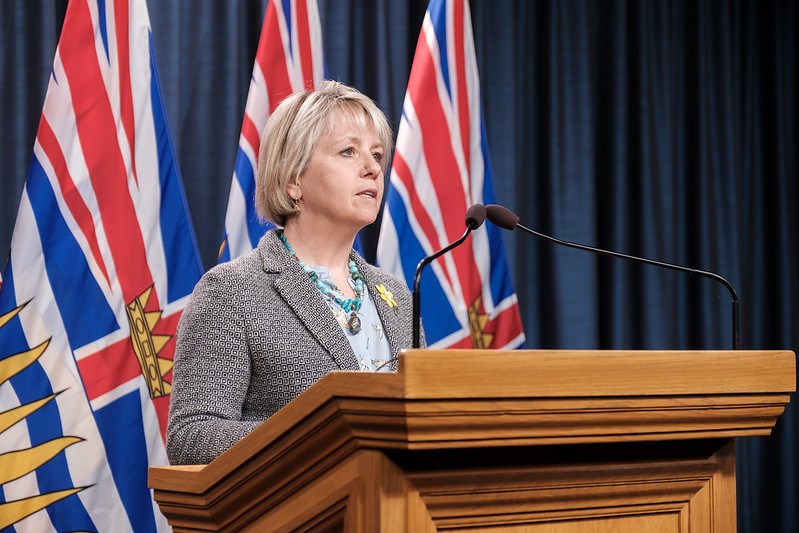B.C. continues to endure its third wave in the COVID-19 pandemic, with a mix of good and bad news.
BC Centre for Disease Control officials detected 873 new infections in the past day, which may sound high, but it is the lowest number of cases identified in a 24-hour period since 832 cases were found on April 1. Health officials warned that the number may be revised because of a glitch in the reporting system.
The new cases raise the total number of COVID-19 infections in B.C. to 113,702, since researchers discovered the first infection in the province in January, 2020. Almost 90%, or 102,268 people, are deemed by the province to have recovered.
The vast majority of those infected have been told to self-isolate, although 377 are in hospital, with 116 of those in intensive care units.
The number of those actively battling infections fell by 181 overnight, to 9,756 people.
Another two people have died while fighting COVID-19 infections in the past day, raising B.C.'s death toll from the disease to 1,515.
Here is the breakdown of where the 873 people with infections detected in the past day reside, by health region:
• 218 in Vancouver Coastal Health (25%);
• 512 in Fraser Health (58.6%);
• 43 in Island Health (4.9%);
• 72 in Interior Health (8.2%); and
• 28 in Northern Health (3.2%).
Health officials are also monitoring a steadily rising number of people. There are a record 16,290 now being monitored for symptoms because they have had known contact with individuals identified has having been infected. That is 305 more people than the record number of those being monitored yesterday.
The province's vaccination campaign has ramped up in recent weeks but is not hitting record highs for the number of newly vaccinated people on a consistent basis. Officials provided 36,892 doses of vaccine to 36,851 people in the past day, with 41 people getting needed second doses.
In the three days up until yesterday, the province vaccinated an average of 28,981 new people per day, with about 14 others per day getting needed second doses.
The record for most vaccinations in a day came on April 9, when health officials administered 40,018 doses to 39,976 new people, with 42 others getting needed second doses.
In total, B.C. has provided 1,148,993 doses of vaccine to 1,061,208 people, with 87,785 getting needed second doses, since the first vaccination was provided on December 16.
For the first time in four days, the B.C. government released data to show how much mutant strains of the virus are spreading. Those strains are thought to spread more easily, may cause more severe illness and may be resistant to vaccines.
Provincial health officer Bonnie Henry last week said that health officials would do fewer full genome sequencing tests on cases that are known through PCR test results to be likely variants of concern.
The standard process through the first week of April was for BC Centre for Disease Control researchers to screen about 90% of new positive COVID-19 cases with PCR tests to determine if the cases were likely variants of concern. Researchers would then take any positive test and conduct full genome sequencing to determine the exact variant in the infection.
The new process is to focus limited resources on monitoring to determine whether someone has been reinfected, whether there has been what Henry called "vaccine failures," and for what she called "escape variants," which may not respond well to B.C.'s immunization program.
Nonetheless, provincial researchers found 1,110 new cases of variants of concern in the past four days. Of the 5,221 cases of concerning variants discovered in B.C. so far, 258 are people actively fighting the COVID-19. No one has died, and the remainder have recovered.
The new variant cases include 555 of the P.1 variant, first discovered in Brazil, 545 of the B.1.1.7 strain first discovered in the U.K. and 10 of the B.1.351 variant first discovered in South Africa.
In total, the B.1.1.7 strain has been the most common, with 3,627 infections. That compares with 1,529 cases of P.1, and 65 cases of B.1351.
While deaths have been more common among older people, younger adults, by far, are more likely to contract infections.
Provincial data show that of the 112,829 infections known up until April 12:
• 5,514 were aged under 10 (4.9%);
• 11,358 were aged between 10 and 19 (10.1%);
• 25,750 were aged between 20 and 29 (22.8%);
• 20,703 were aged between 30 and 39 (18.3%);
• 16,702 were aged between 40 and 49 (14.8%);
• 14,318 were aged between 50 and 59 (12.7%);
• 9,213 were aged between 60 and 69 (8.2%);
• 4,962 were aged between 70 and 79 (4.4%);
• 2,903 were aged between 80 and 89 (2.6%);
• 1,382 were older than 90 years (1.2%); and
• 24 were of unknown age (less than 0.1%).
There are seven active outbreaks listed as being at long-term living or B.C. seniors' homes. They are:
• Acropolis Manor in Prince Rupert;
• Chartwell Langley Gardens in Langley;
• Cottonwoods Care Centre in Kelowna.
• Dufferin Care Centre in Coquitlam;
• Joseph & Rosalie Segal & Family Health Centre;
• Longlake Chateau in Nanaimo; and
• Sunset Manor in Chilliwack.
The outbreak at Chilliwack General Hospital is now over.
Five hospitals in B.C. also have active COVID-19 outbreaks. They are:
• Abbotsford Regional Hospital in Abbotsford;
• Prince Rupert Regional Hospital in Prince Rupert;
• UBC Hospital in Vancouver;
• Vancouver General Hospital in Vancouver; and
• Vernon Jubilee Hospital in Vernon.
Some other news was that the B.C. government extended its state of emergency until the end of day on April 27, 2021. The government by law can only extend the state of emergency by a maximum period of two weeks, and it has been doing that every two weeks for more than a year.
[email protected]



